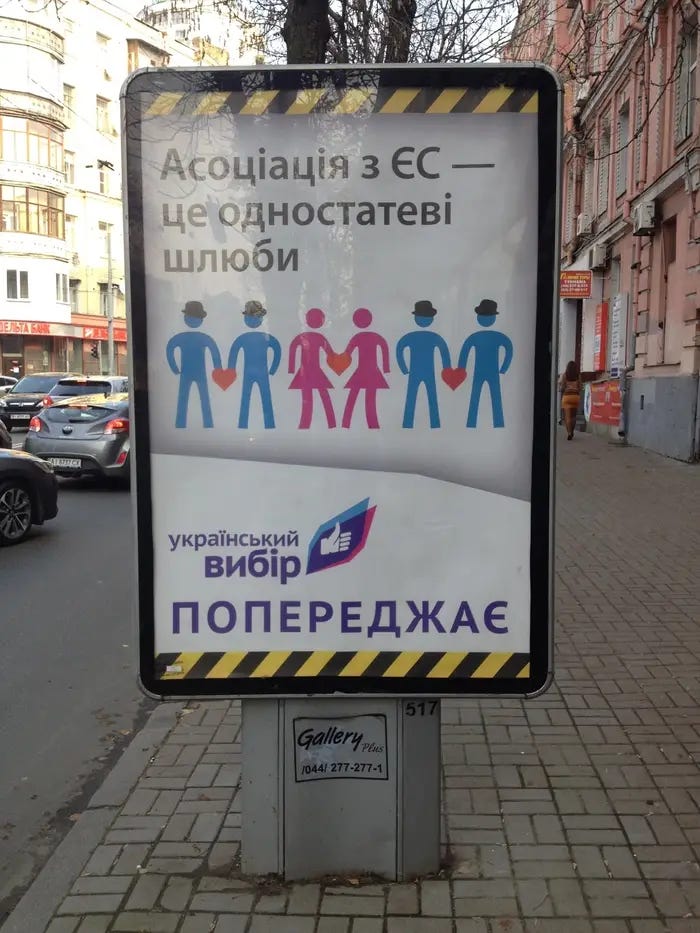My talk to the NYC Bar Association
Last week, the New York City Bar Association invited me to speak about LGBTQ persecution in Ukraine and the decade-plus movement to have queer persecution recognized as a crime against humanity.
Last week, the New York City Bar Association invited me to speak about LGBTQ persecution in Ukraine and the decade-plus movement to have queer persecution recognized as a crime against humanity.
It gave me a great chance to distill why this moment is so important and engage with an audience knowledgeable about international law. I also shared some thoughts about the role of journalism in advancing this movement. Here’s some of what I said:
The past decade saw an unprecedented use of LGBTQ persecution as a weapon of war.
In 2013, when Ukraine was considering joining the European Union, Russian allies fueled fear of LGBTQ people in Ukraine to try to drive a wedge between Ukraine and the EU. Putin honed his anti-queer campaign over the years as a tool to attack ideas of fundamental human rights and democracy, and, ultimately, used it to justify the full-scale invasion of Ukraine in 2022.
In Iraq and Syria, ISIS turned the executions of men accused of homosexuality as propaganda to claim it was fighting against Western “debauchery.”
The Taliban widely persecuted LGBTQ people in Afghanistan as it reclaimed control following the US withdrawal in 2021.

A growing legal movement to have LGBTQ persecution recognized as a crime against humanity.
The Human Rights and Gender Justice Clinic at CUNY Law School has done key work in this effort. CUNY’s Lisa Davis submitted a brief to the International Critical Court arguing that LGBTQ persecution could be charged as a form of “gender persecution” under language of the Rome Statute, the treaty that created the International Criminal Court.
The ICC’s prosecutor endorsed the legal logic in a 2022 policy paper written by Davis which states, “At their core, gender-based crimes are used by perpetrators to regulate or punish those who are perceived to transgress gender criteria that define ‘accepted’ forms of gender expression manifest in, for example, roles, behaviors, activities, or attributes.”

But it’s unclear whether ICC judges will agree.
The very idea of gender persecution was controversial when the ICC was created in the 1990s, in part because some states were afraid it could lead to protections for LGBTQ people.
The lingering controversy — and a limited understanding of gender-based violence by the court’s jurists — meant that prosecutors never successfully charged anyone with any form of gender persecution during the court’s two decades.
Now is a critical moment to establish precedent that LGBTQ persecution is a crime against humanity.
But making that happen will require two essential things:
Document the crimes
The cases of queer victims of persecution must be documented in places where the ICC has open matters, and survivors and witnesses must be protected and supported so they are able to come forward.
Ukraine is an ideal place to undertake this work, because while the Russian government is fueling its war with anti-queer propaganda, the Ukrainian government and society is growing increasingly supportive of LGBTQ people’s rights. It is a far safer place for victims to come forward than someplace like Afghanistan.
People need to understand the law. And jurists need to understand the stakes.
We need more high-impact journalism about gender-based violence in war, so that judges, diplomats, and policymakers have an intuitive understanding of the issues before a case comes before them.
Stories shape the air in which advocacy breathes.
Narrative drives public opinion, frame issues for jurists and policy makers, and anchor themselves in collective memory for generations. Stories are the way society understands who belongs — who is part of our community, who has the right to have rights, and what pluralism in democracy really means.
Since my story ran in The New York Times, people from around the world — and from multiple government institutions — have told me that this kind of journalism changes the conversation.
I’ll share more thoughts about journalism’s role and how The Queer Face of War fits into my current work in an upcoming newsletter.
Thanks for the continued support!



